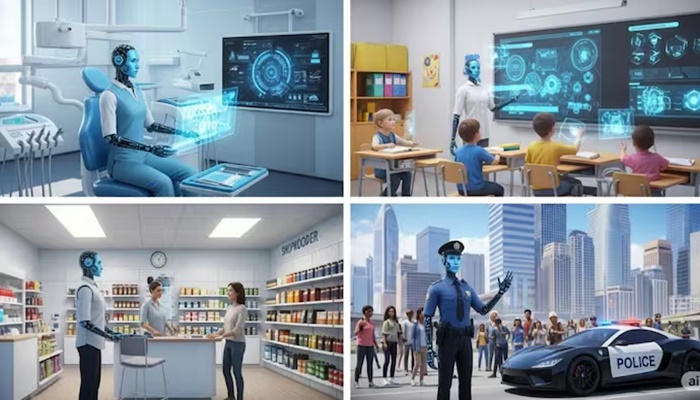The AI Revolution Is Here: Are You Ready?
Workplace transformation is no longer a distant possibility—it’s happening now. According to the World Economic Forum’s Future of Jobs Report 2025, artificial intelligence will create 170 million new jobs while displacing 92 million by 2030. This represents a fundamental shift in work, not the apocalyptic job destruction many fear.
IBM research reveals that 87% of executives expect jobs to be augmented rather than replaced by generative AI. The key distinction lies in understanding that this revolution demands adaptation, not surrender. Those who develop the right skills now will thrive in an AI-enhanced workplace, while those who resist change may be left behind. The question isn’t whether AI will transform your industry—it’s whether you’ll be prepared when it does.
Why Traditional Job Security No Longer Exists
The concept of job security based on tenure and traditional skills is rapidly becoming obsolete. The World Economic Forum’s Future of Jobs Report 2025 indicates that 39% of key skills required in jobs will change by 2030, representing unprecedented workforce disruption.
Technology has emerged as the most disruptive force in the labor market, outpacing economic shifts and demographic changes. The traditional career ladder will be completely restructured, where professionals no longer climb predictable steps within established hierarchies.
Today’s professionals are likely to hold twice as many jobs throughout their careers compared to their predecessors from just 15 years ago. This shift reflects a fundamental change in how businesses operate and what they value in employees. The old model of learning skills once and applying them for decades has been replaced by a dynamic environment requiring continuous adaptation and skill evolution.
Here are the ten skills employees must master to survive and thrive in the AI job revolution:
Skill #1: Master AI Tools And Platforms Before Your Competition Does
AI literacy has become as fundamental as computer literacy was in the 1990s. Current research shows that professionals are more than twice as likely to add AI skills today compared to 2018, with hiring managers increasingly prioritizing candidates with AI familiarity. More than half of hiring managers report they wouldn’t hire someone without AI literacy skills, making this competency essential for career advancement.
The demand for AI literacy skills has increased sixfold in the past year alone, yet only one in 500 jobs currently list these requirements, creating a significant opportunity gap. Start by familiarizing yourself with accessible AI tools like ChatGPT, automation platforms, and industry-specific applications.
Understanding how to prompt AI systems effectively, interpret their outputs critically, and integrate them into your workflow will distinguish you from colleagues who view AI as a threat rather than a powerful ally.
Skill #2: Develop Sharp Critical Thinking To Navigate AI’s Blind Spots
While AI excels at processing information and generating responses, it lacks the nuanced judgment humans bring to complex decisions. Growing concerns around bias in AI models, fairness in decision-making, and ethical implications of automation make critical thinking more valuable than ever.
Professionals must develop the ability to assess AI-generated insights, question underlying assumptions, and identify potential biases in data or algorithms. This skill involves analyzing information from multiple perspectives, evaluating the reliability of AI outputs, and making informed decisions that balance efficiency with ethical considerations.
Problem-solving and critical thinking skills are inherently “AI-proof” because they require human judgment, contextual understanding, and moral reasoning that machines can’t replicate. Organizations increasingly seek employees who can serve as the human intelligence layer that responsibly guides AI implementation.
Skill #3: Become Data-Fluent In An Analytics-Driven World
Data analysis capabilities represent one of the fastest-growing skill categories in the modern workplace. AI and big data top the list of emerging competencies employers prioritize when hiring and promoting employees.
Understanding how to clean, process, and visualize data has become essential for preparing information for AI models and interpreting their results effectively. This doesn’t require becoming a data scientist, but professionals need familiarity with data visualization tools, statistical concepts, and the ability to spot patterns and anomalies in datasets.
Skills in identifying data quality issues, understanding sampling bias, and communicating insights through clear visualizations are increasingly valuable across all industries. As AI systems become more sophisticated, humans working with data intelligently and extracting meaningful business insights will remain indispensable to organizational success.
Skill #4: Learn Programming Basics – Python Is Your Gateway
Programming knowledge has expanded beyond traditional technology roles to become valuable across diverse professions. Python has emerged as the dominant language in AI and machine learning, with most AI projects utilizing Python-based frameworks and libraries. You don’t need to become a software engineer to benefit from basic programming literacy, but understanding how these languages power AI models helps you customize automation tools, interpret AI-generated insights, and communicate effectively with technical teams.
Python’s simplicity and extensive library ecosystem make it an ideal starting point for professionals seeking to understand AI capabilities. Even basic familiarity with programming concepts enables better collaboration with technical teams and more informed decision-making about AI tool selection and implementation. This knowledge gap represents a significant opportunity for non-technical professionals willing to invest time in learning foundational programming skills.
Skill #5: Strengthen Your Emotional Intelligence For Human-Centered Work
As AI assumes responsibility for routine and analytical tasks, emotional intelligence becomes increasingly valuable in the workplace. Soft skills like empathy, communication, and interpersonal relationship management remain irreplaceable by artificial intelligence.
Professionals with high emotional intelligence adapt more smoothly when AI tools are integrated into their roles because they understand how to leverage technology while maintaining human connections. The ability to read emotional cues, navigate complex interpersonal dynamics, and provide genuine human support becomes more valuable as AI handles transactional interactions.
Organizations recognize that while AI can efficiently process customer inquiries, human emotional intelligence is essential for building trust, resolving complex conflicts, and creating meaningful relationships. Developing emotional intelligence involves practicing active listening, understanding diverse perspectives, and building genuine empathy for colleagues and clients.
Skill #6: Unleash Your Creativity To Amplify AI’s Capabilities
Creativity represents one of the most distinctly human capabilities, amplifying rather than competing with AI potential. While AI can generate content, images, and solutions based on existing patterns, human creativity involves original thinking, innovative problem-solving, and the ability to make unexpected connections between disparate concepts.
Creative thinking and resilience are becoming important as organizations seek employees who can harness AI capabilities innovatively. This might involve developing unique AI-generated content, designing novel automation workflows, or applying AI solutions to unexpected challenges.
Creativity in the AI era means learning to collaborate with artificial intelligence as a creative partner rather than viewing it as competition. The most valuable professionals will be those who envision new possibilities, challenge conventional approaches, and use AI tools to bring innovative ideas to life.
Skill #7: Build Cybersecurity Awareness To Combat AI-Powered Threats
The rise of artificial intelligence has created new cybersecurity challenges that every professional must understand. AI-powered threats, including sophisticated phishing scams, deepfake attacks, and automated malware, make cyberattacks more convincing and widespread than traditional methods.
As organizations recognize the escalating threat landscape, networks, and cybersecurity skills are among the fastest-growing competencies. Professionals need to be aware of how cybercriminals can weaponize AI and how to identify these advanced threats.
This includes understanding the capabilities and limitations of AI-generated content, recognizing deepfake audio and video, and maintaining healthy skepticism about digital communications. While not everyone needs to become a cybersecurity expert, basic awareness of AI-enhanced threats and protective measures is essential for all professionals who work with digital systems and handle sensitive information.
Skill #8: Embrace Lifelong Learning As Your Career Insurance
Continuous learning has evolved from a nice-to-have professional development activity to an essential career survival strategy. As technological change accelerates, curiosity and lifelong learning are rising in importance.
Recent data shows that 50% of the workforce completed training as part of learning and development programs, representing a notable improvement from previous years. This upward trend spans nearly every industry, underlining the growing recognition of continuous skill development as critical to career longevity.
As AI evolves rapidly, professionals must embrace ongoing education to stay relevant and valuable. This means regularly updating technical skills, staying informed about industry trends, and remaining adaptable to new tools and methodologies. The most successful professionals treat learning as an ongoing investment rather than a one-time educational achievement.
Skill #9: Understand AI Ethics To Lead Responsible Implementation
Knowledge of AI ethics is becoming crucial as organizations grapple with responsible artificial intelligence deployment. Professionals need upskilling in AI ethics and data management to address growing concerns about algorithmic fairness, transparency, and privacy.
Understanding the five pillars of AI ethics—fairness, robustness, explainability, transparency, and privacy—through real-world applications helps create trustworthy AI systems. This involves learning to identify potential biases in AI models, understanding data privacy implications, and ensuring that AI implementations align with organizational values and regulatory requirements.
Professionals who can evaluate AI tools ethically and guide responsible implementation will be increasingly valuable to organizations seeking to harness AI benefits while mitigating risks. This skill set positions professionals as ethical leaders who can navigate the complex landscape of AI governance and compliance.
Skill #10: Perfect Strategic Communication To Bridge Technical And Business Teams
Translating complex AI concepts into actionable business insights has become essential for career advancement. AI professionals increasingly need to explain technical concepts to stakeholders who may lack technical backgrounds, requiring sophisticated communication skills.
Cross-functional collaboration is becoming the norm as AI projects typically involve diverse teams, including technical developers, business leaders, and end users. The most valuable professionals can interpret AI-generated data, communicate insights clearly to decision-makers, and facilitate productive discussions between technical and business teams.
This involves developing presentation skills, simplifying complex concepts without losing accuracy, and building the ability to tailor communication styles to different audiences. Strategic communication skills enable professionals to serve as vital bridges between AI capabilities and business objectives.
Conclusion
The AI revolution presents both unprecedented challenges and remarkable opportunities for working professionals. Rather than fearing artificial intelligence as a threat to employment, competent professionals recognize it as a powerful tool that can enhance human capabilities and create new career possibilities. The ten skills outlined here represent a roadmap for thriving in an AI-enhanced workplace, combining technical literacy with uniquely human competencies that remain irreplaceable.
Success in AI requires balancing hard and soft skills, embracing continuous learning, and developing the ability to work alongside artificial intelligence rather than competing against it. The professionals who invest in these capabilities now will find themselves well-positioned for the 170 million new jobs AI advancements will create over the next decade.
Start developing these skills today, focus on areas that align with your career goals, and view AI as a collaborative partner in your professional journey rather than an existential threat to your livelihood.




















